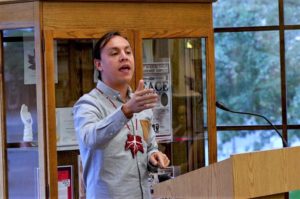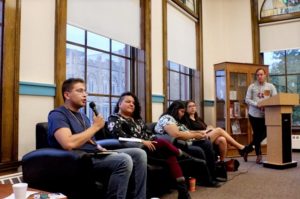Importance of reconciliation emphasized at youth-focussed panel discussion

By Rick Garrick
THUNDER BAY — Canadian Roots Exchange executive director Max FineDay emphasized the importance of reconciliation during the In Conversation with Max FineDay panel discussion on Sept. 18 at the Thunder Bay Public Library’s Brodie Fireside Reading Room.
“I spent time today with about 100 Grade 7 and 8 students at Edgewater Park School and I got to talk to them a little bit about … reconciliation,” says FineDay, a citizen of Sweetgrass First Nation in Saskatchewan. “I got to talk to them about what they are learning in their schools, I got to talk to them about what they see for the future of this country, more importantly, the future of the land that is here.”
FineDay says one of the students told him his comments on reconciliation were “pretty cool.”
“If we can make reconciliation cool, we’ve done half the work,” FineDay says, noting that the students were from a variety of backgrounds, including students whose families had been in Canada for four generations, students whose parents had moved to Canada from another country and Indigenous students. “I had the opportunity to talk to them about what they see as their challenges but also what they hoped for. In that conversation, I asked them how many of them had heard this word reconciliation, and everybody put up their hand. I asked then how many of them knew what that word means — a lot of hands went down. And I think that is a perfect metaphor for where we are as a country.”
FineDay says when he talks to Indigenous and non-Indigenous people about reconciliation across the country, there is sometimes a “hesitation to talk about this word.”
“And I want to name that here tonight,” FineDay says. “There are people who are angry at the word reconciliation — it doesn’t make any sense — and I’ve heard that in corners across this country.”
FineDay asked the four panelists — Beau Boucher-McLaren and Stephanie MacLaurin, both from Fort William, Ardelle Sagutcheway, from Eabametong, and Shelby Gagnon, from Aroland — a range of questions during the panel discussion, including what were some of barriers they faced.
“Some of the barriers they do face are a little bit more different from mine,” Boucher-McLaren says. “I stated I have a lighter skin tone so I kind of blend into some of the crowds that they face those barriers from.”

Boucher-McLaren adds that it was important for Fort William citizens to participate on the panel.
“I feel it is always important to lead our way as an Indigenous community, especially coming from the territory of Fort William that the City of Thunder Bay is placed in,” Boucher-McLaren says. “It is very important to be there and be a loud voice and a strong person that people can look up to.”
Sagutcheway says the panel discussion was “intense.”
“Sometimes, those are the hard questions that we need to answer especially with what is going on in Thunder Bay,” Sagutcheway says, noting it is important to be visible in the community. “There is not a lot of friendly space for Indigenous people, so I think by coming to this event and maintaining that presence we’re creating more safe space.”
Gagnon, who recently accepted a new part-time role as a community animator with the Canadian Roots Exchange, says it was “awesome” to see how inspiring and passionate the other panelists were.
“They are doing such amazing things in the community,” Gagnon says. “It was nice to share my perspective and lived experiences.”


